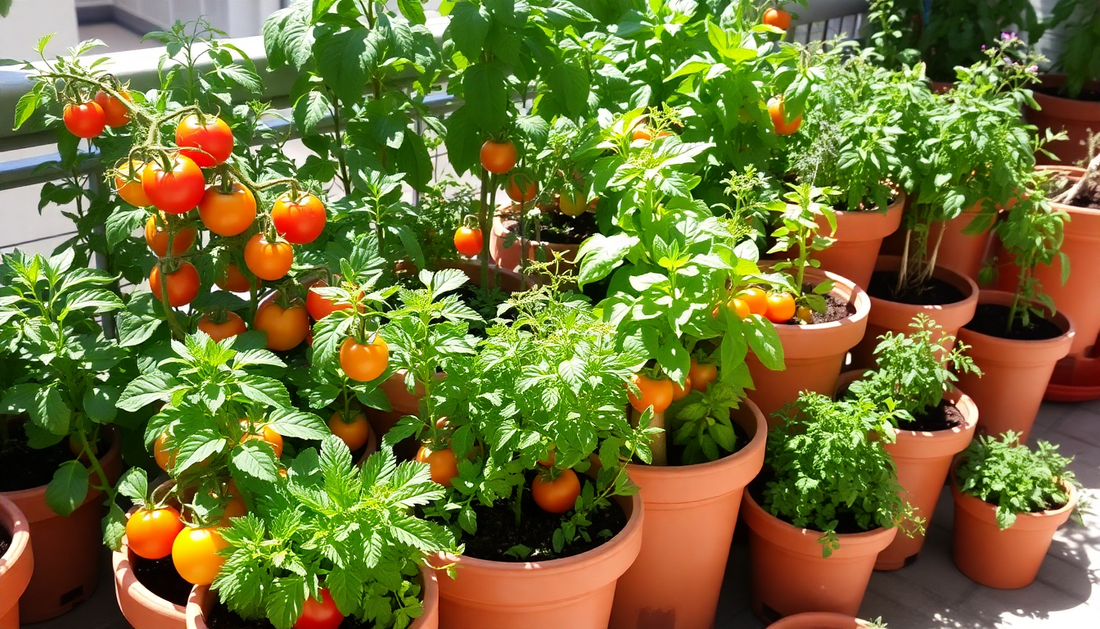
Thriving Veggies in Pots: A Guide to Cultivating a Bountiful Container Garden
Share
Gardening enthusiasts, are you ready to unlock the secrets to growing a thriving vegetable garden, even if you're limited on space? Look no further than the world of container gardening! In this comprehensive guide, we'll explore the art of cultivating a bountiful harvest of fresh, flavorful vegetables in the comfort of your own patio, balcony, or even indoors.
Choosing the Right Containers
The foundation of a successful container garden lies in the vessels you choose to house your plants. When it comes to selecting the perfect pots, consider the following factors:
Size Matters
The size of your container will directly impact the growth and productivity of your vegetable plants. As a general rule, the larger the pot, the more room for root development and nutrient absorption. Opt for containers that are at least 12 inches deep and wide, with ample drainage holes to prevent waterlogging.
Material Matters
The material of your containers can also influence the growing conditions. Terracotta, ceramic, and wooden planters are excellent choices as they allow for proper air circulation and drainage. Avoid using non-porous materials like plastic or metal, as they can trap moisture and stifle plant growth.
Raised Beds for the Win
If you have the space, consider investing in raised garden beds. These elevated structures not only provide ample room for your vegetable plants to thrive but also improve soil quality and drainage, making them an ideal choice for container gardening.
Soil Preparation: The Foundation for Success
The quality of your soil is paramount to the health and productivity of your container garden. Start by using a high-quality potting mix specifically formulated for vegetables. These mixes are typically enriched with nutrients and organic matter, providing the perfect foundation for your plants to flourish.
Amending the Soil
To further enhance your soil's fertility, consider adding compost or well-rotted manure. These organic amendments will improve soil structure, water retention, and nutrient availability, all of which are crucial for healthy vegetable growth.
Drainage is Key
Ensuring proper drainage is essential to prevent waterlogging and root rot. Mix in a handful of perlite, vermiculite, or coarse sand to improve soil aeration and drainage.
Selecting the Right Vegetables
When it comes to container gardening, not all vegetables are created equal. Some thrive in the confined spaces of pots, while others may struggle. Here are some of the best vegetable options for your container garden:
Tomatoes
Tomatoes are a classic choice for container gardening. Look for compact, bush-type varieties that are well-suited for pots, such as cherry tomatoes or dwarf cultivars.
Peppers
Peppers, both sweet and spicy, are another excellent option for container gardens. They come in a variety of shapes, sizes, and colors, making them a visually appealing addition to your outdoor space.
Leafy Greens
Leafy greens, such as lettuce, spinach, and kale, are perfect for container gardening. They require relatively shallow pots and can be grown in succession for a continuous harvest.
Herbs
Herbs are a must-have in any container garden. From fragrant basil to versatile parsley, these flavorful plants thrive in pots and can be easily incorporated into your culinary creations.
Root Vegetables
While not as common in container gardens, certain root vegetables, like radishes, carrots, and beets, can be successfully grown in pots, provided the containers are deep enough.
Watering and Feeding
Proper watering and fertilization are crucial for the health and productivity of your container-grown vegetables. Here are some tips to keep your plants thriving:
Watering Wisely
Container-grown plants require more frequent watering than their in-ground counterparts. Check the soil daily and water when the top inch or two becomes dry. Avoid letting the soil become completely dry, as this can lead to stress and stunted growth.
Fertilizing for Optimal Nutrition
To ensure your vegetables receive the necessary nutrients, apply a balanced, water-soluble fertilizer every two to three weeks during the growing season. This will replenish the soil and provide a steady supply of essential nutrients for your plants.
Pest and Disease Management
While container gardening can minimize some common garden pests and diseases, it's still important to be vigilant and address any issues that arise. Keep an eye out for signs of insect infestations or fungal diseases, and take action with organic, eco-friendly solutions to protect your plants.
Maximizing Your Harvest
To get the most out of your container garden, consider these tips:
Succession Planting
Extend your harvest by practicing succession planting. This involves sowing new seeds or transplanting seedlings every few weeks, ensuring a continuous supply of fresh produce throughout the growing season.
Vertical Gardening
Utilize vertical space by incorporating trellises, cages, or stakes to support climbing vegetables like tomatoes, cucumbers, and pole beans. This not only saves valuable ground space but also improves air circulation and reduces the risk of disease.
Companion Planting
Strategically placing certain plants together can create a symbiotic relationship, deterring pests and promoting overall plant health. For example, planting marigolds or basil alongside your vegetables can help repel common garden pests.
Embracing the Joys of Container Gardening
Cultivating a thriving vegetable garden in containers may seem like a daunting task, but with the right knowledge and a little bit of care, you can enjoy a bountiful harvest right from your own backyard, balcony, or indoor space. Embrace the joy of watching your plants grow, the satisfaction of harvesting your own fresh produce, and the pride of creating a beautiful, edible oasis in your own personal space.
Happy gardening!
